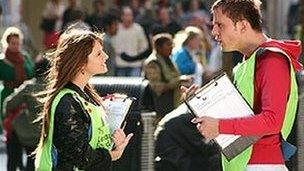Charity fundraisers subject to new rules
- Published
- comments

Chuggers are not allowed to stand within 3m of a cash machine or shop doorway
Charities now face fines of at least £1,000 if their street fundraisers breach rules designed to protect members of the public.
The restrictions mean that fundraisers, typically referred to as "chuggers", cannot follow a person for more than three steps.
The introduction of the scheme follows a year-long trial.
Chuggers have been criticised for hassling people to set up direct debits, but others say they are vital.
The new regime, to be enforced across the UK by the Public Fundraising Regulatory Association (PFRA), also means street fundraisers must not:
•stand within 3m of a shop doorway, cash machines, pedestrian crossing or station entrance
•sign up anyone to a direct debit who, due to illness, disability, drugs or drink, is unable to give informed consent
•approach members of the public who are working, such as tour guides or newspaper vendors
Breaches of the rules carry penalty points of up to 100 points for the fundraising organisation.
Each charity has a threshold of 1,000 points before having to pay fines. Once this threshold is breached, charities must pay a monetary fine equal to £1 per point, with all further breaches all carrying a £1 per point fine.
At the end of the financial year, the charity's point balance is reset to zero.
All the money raised through the fines system will be used to improve compliance checks, in what the PFRA says creates a "virtuous circle".
"The more people that break the rules, the more money we have for providing compliance officers to check street fundraisers are complying with the new regime," said Ian MacQuillin, PFRA head of communications.
PFRA will monitor compliance with the new roles via spot checks, as well as so-called mystery shoppers who pretend to be a member of the public and then report back.
'Commercialisation'
Members of the public who believe the rules have been breached should complain directly to the charity in the first instance, says the PFRA.
If they feel the charity's response is unsatisfactory, the PFRA says they should then escalate their complaint by reporting it to the independent regulatory body, the Fundraising Standards Board.
"For a form of fundraising that is so regularly in the limelight, it is vitally important that fundraisers work to the highest possible standards in order to maintain the confidence of the public, media, and central and local government," says Sally de la Bedoyere, chief executive of the PFRA.
Marjorie Wallace, the chief executive of the mental health charity SANE, which has never used street fundraisers, welcomed the rules.
However, Ms Wallace also criticised charities who use firms that employ street fundraisers, arguing they symbolised "all that is wrong in the commercialisation of charity".
"True philanthropy is not gained by the quick-fix tactics of waylaying passers-by, but by establishing relationships with donors who know precisely what happens to their gifts and who feel a connection to the cause," added Ms Wallace.
But one small charity, the Coventy Cats Group, which relies on street collections, told BBC News that it was concerned that the new rules and spot checks may make fundraising more complex.
Trustee Angie Willems also said she was worried about the impact of not being able to stand within three metres of shop doorways.
"We never harass people to donate, but we do often need to stand somewhere that can provide some warmth or protection from the elements."